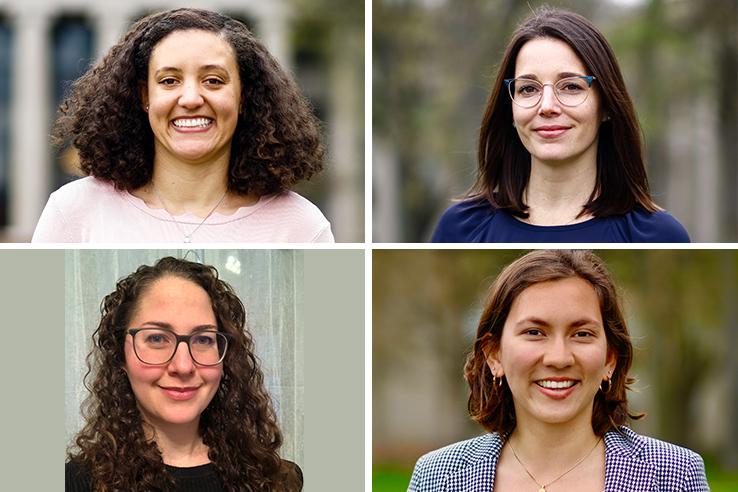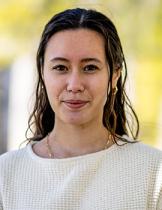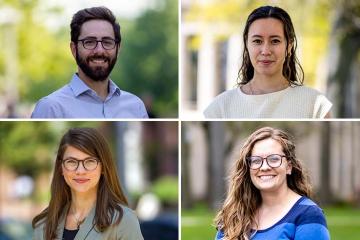
J-PAL North America Staff Spotlight: Homelessness & Housing Stability Team

Bottom row, left to right: Laina Sonterblum, Caitlyn Ark
In the fourth installment of our Staff Spotlight series, we feature three J-PAL North America staff members who have supported our work to expand the evidence base on strategies to reduce and prevent homelessness and encourage long-term housing stability. These team members offer a window into their policy and research roles by sharing about workplace culture and favorite projects.
Amanda Lee
Senior Research Manager Amanda Lee leads our Research Management Support (RMS) and evaluation incubators while supporting the homelessness and housing stability team. Learn about the projects she’s currently working on and hear her insight into the research team at J-PAL North America.
What drew you to J-PAL North America?
I’m definitely happy when my work can make a positive contribution to the world, so the mission really drew me to the organization. J-PAL has a commitment to reducing poverty, which is complemented by a commitment to using evidence—we aim to produce rigorous evidence on programs or policies that impact people’s lives.
Tell me about what you’re working on right now.
I’m managing our Bay Area Evaluation Incubator, which provides training and technical support to direct service providers to design randomized evaluations. This evaluation incubator is unique from previous ones because we’re running multiple projects that are geographically and topically focused. The direct service providers are in California and hope to evaluate the impact of cash transfers on homelessness and housing stability. The evaluation process can last for years, so everything is still in early stages, but we have some promising projects at this point. It’s been cool to see the excitement around the possibility of designing and running these evaluations, both from the partners and from the researchers.
Do you have a favorite project?
One of my favorite projects is AMP Up Boston. It’s a collaboration between Co-Scientific Director Dr. Lawrence Katz; Economic Mobility Pathways (EMPath), the organization providing project services; and the Boston Housing Authority to evaluate a new version of a comprehensive economic mobility coaching program. I’ve been involved in multiple phases of the project—from thinking about design and study protocols, to the IRB submission process, to participant recruitment, to hearing from participants. It’s a local project and it’s nice to feel like I’m having an impact in my own backyard, so to speak.
What might people find surprising about the research team?
Those of us on the research team—whether research associates or research managers—all shape our roles to play to our strengths. We don’t all have to be experts at absolutely every facet of the job. It might depend on the overall balance of the team, but at J-PAL, it’s very possible to bring your strengths to the role and complement the strengths of others on the team.
What interests do you have outside of work?
I sing in a couple of choruses. I’ve been singing in both for over ten years and it is really a lot of fun. One group performs classical works and we often perform with an orchestra. The other is called the Kuumba Singers of Harvard College. The group is mostly undergrads but it’s open to everybody, including non-students and students from other schools. We sing music of the African diaspora, including spirituals, gospel, African folk songs, and contemporary music.
Bridget Mercier
Policy and Training Manager Bridget Mercier leads our housing and homelessness stability team and manages our training team to build the capacity of researchers and practitioners to generate and apply evidence.
What did you do before coming to J-PAL North America?
I went to the University of New Hampshire for undergrad, and after graduating, I knew I wanted to get into the nonprofit space and work in service of others. I grew up in New Hampshire, so I also wanted to explore a new location! I decided to join AmeriCorps VISTA and did two years of service in Los Angeles. My experience as a VISTA Leader for the Los Angeles Unified School District motivated me to get my graduate degree in public administration and public policy and have a broader impact.
After my master's program, I worked for the New York City Department of Education. It was a wonderful way to apply what I had learned in my early career and in graduate school to another educational context.
What do you like most about J-PAL North America?
First and foremost, the staff! I've really enjoyed getting to know my colleagues—everybody's super smart, thoughtful, and supportive.
In addition to being passionate about our mission, it’s nice to work for an organization that is so intentional about the policies and processes we have in place to move our important work forward.
What current projects excite you most?
I'm really excited about the open Housing Stability Evaluation Incubator, where we are looking to identify service providers and other organizations who are interested in assessing the impact of homelessness prevention and reduction programs. This is a great opportunity to provide support directly to organizations to help them design and develop randomized evaluations of their programs.
More broadly, our goal of building a base of rigorous evidence on effective strategies that address homelessness and promote housing stability is incredibly important. Homelessness is one of the most severe manifestations and outcomes of poverty. Given the urgency and importance of providing stable housing to those in need, I’m humbled to have the opportunity to work in this space.
What is your proudest moment here?
Supporting this year’s Evaluating Social Programs course was one of my proudest accomplishments. It was really rewarding to put on a course that helps many different stakeholders get a better understanding of impact evaluation. I was also able to serve as a teaching assistant (TA), working with a small group of participants (many of whom were focused on housing) to further support their learning. I really liked getting to know my TA group members and appreciated all their questions and the way they engaged deeply with the course content.
What is on your travel bucket list?
Two countries that are definitely on my bucket list are Portugal and Greece. I’ve had family members and friends who have gone to both and had the best time, so I’d love to be able to take trips there.
Laina Sonterblum
Laina Sonterblum is a senior policy associate at J-PAL North America, where she supports our work in homelessness and housing stability and education. Read how she incorporates a social work lens into her current policy role.
What drew you to J-PAL North America originally?
I was very drawn to the organization’s mission of building and leveraging evidence to reduce poverty. On top of that, the policy position seemed very dynamic, with the ability to wear a lot of different hats and provide input in a variety of areas, and that was really exciting to me.
How does your current role relate to your professional background?
My background is in social work and I’m a licensed social worker. I think the mission of J-PAL North America and the mission of social work are fairly well aligned; part of the mission of social work is to enhance well-being and help people meet their basic needs, and there’s a particular focus on ending poverty. The two missions complement each other well. Social justice is also one of the core values of social work, and I try to bring that to the table by blending previous direct-practice experience with my current role of looking at policy and poverty alleviation on a more macro and systemic level.
Do you have a favorite work project?
I’ve enjoyed providing technical assistance to organizations in the Bay Area and building their capacity to design randomized evaluations of cash transfer programs. I like collaborating with stakeholders who are on the ground implementing programs and creating policies.
What does your workspace look like?
It is somewhat chaotic and disorganized, but I know where everything is. It’s kind of funny—I love to be organized in my work, but my physical spaces rarely reflect that. I have stuff all around me and it kind of stresses me out, but I also kind of like it.
What hobbies or interests do you have outside of work?
I love every kind of TV—ranging from reality TV like the Bachelor, to Marvel/Star Wars/DC shows, to murder mysteries, and everything in between. You name it, I will watch it. I also love cooking and baking, particularly baking bread. I have found bread to be one of my favorite stress reduction techniques. You need to let it rest, rise, and proof—that’s a very calming time. Then you knead it, which is good for getting out aggression. You have to let it rise a second time, and I’m usually very productive for that hour while I wait. Finally, you get to eat bread, which is another excellent stress reduction strategy.
Caitlyn Ark
Caitlyn Ark is a former policy and research co-op who supported work in homelessness and housing stability; environment, energy, and climate change; and health care delivery. Read about her experiences as a student and co-op.
How did the co-op role relate to your studies?
I’m a fourth-year undergraduate at Northeastern University, which has a co-op program where students are able to work full-time for six months. In my co-op search, I looked for a job at the intersection of health and policy. I am a biology major and have two minors: mathematics and human services. My quantitative background from mathematics and biology applies itself well to the kind of analysis and experimental design that J-PAL conducts. As the context of social work in the United States is crucial to understand before attempting to mitigate social issues, the classes I’ve taken in social change and human services at Northeastern have given me an important framework to apply to my work at J-PAL.
What was it like to be a co-op?
The co-op/internship program at J-PAL is very flexible. Engaging with different programmatic areas has been really rewarding and introduced me to new areas of the policy and research landscape. J-PAL draws upon different perspectives—clinicians, direct service providers, researchers who develop evaluations, state and local governments, and others in the policy world. I think it’s critical to have a diverse range of perspectives at the table. I’ve enjoyed seeing the research process from start to end—from working with external partners to design randomized evaluations, to implementing evaluations ethically, to tracking outcomes, to disseminating results. It’s been eye-opening to see how people affect change.
What did you enjoy most about J-PAL North America?
Something that sets J-PAL North America apart is the people and culture. Everyone is passionate about helping others. The workplace is collaborative, and at every step of management, there are people who care about the work but also care about you, which is not something you find in all workplaces. I’m very mission-driven, and having evidence-based policy at the forefront of everything J-PAL does is one of the things I like the most about the organization. I think evidence-based policy is so important and it’s essential to be driving that type of work.
If you could meet anyone, who would it be and why?
Grant Imahara from MythBusters was so dynamic, funny, engaging, and full of wisdom. Seeing his excitement about science got me engaged with science and experimental design. His work on the show was a valuable representation of Asian Americans in the science world, and it was complemented by his storytelling skills. It’s important to encourage creativity in science. I want to say that we would be friends—which is another reason I want to meet him—but it would also just be cool to meet a role model.
This post is the fourth in a series highlighting staff at J-PAL North America. Previous posts shared about teams working on heath care, communications and fundraising, and state and local innovation. To learn more about our staff and their accomplishments, follow J-PAL North America on LinkedIn.



